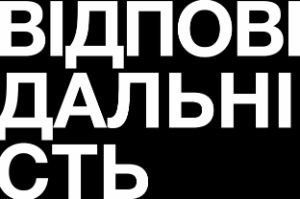Talk | 10 Treffen: Responsibility Treffen
Legacy of Appropriation

In order to introduce postcolonial criticism into the discourse of perception of Ukrainian culture and to address appropriation, together with the invited speakers, we will discuss the origin and initial appearance of Ukrainian culture in Western Europe.
Criticism of appropriation, while not a new discourse in the world in general, sometimes triggers unconscious mental resistance when it comes to the postcolonial subjectivity of countries forced to be part of the USSR in the 20th century. At the same time, unchallenged imperialism and unexamined Russian colonialism are the central reasons for the unprecedentedly high support for military aggression against Ukraine among the Russian population today.
The „inconvenience” of this topic of the legacy of appropriation also stems from the fact that for several centuries, various rulers have tried to justify their denial of Ukraine’s subjectivity by creating the myth that it is not only unable to speak about itself, but also does not exist as a discussion topic. In the process of establishing a discussion, we will address the confirmation bias used to exoticise or sometimes reject Ukrainian culture’s existence as such.
Biographies of the participants:
Dr. habil. Karolina Wigura is a historian of ideas, sociologist and journalist. She is a member of the Board of Kultura Liberalna Foundation, based in Warsaw, and a Senior Fellow of the Center for Liberal Modernity, based in Berlin. Wigura is a lecturer at the University of Warsaw’s Institute of Sociology. Wigura studied social sciences, philosophy and political science at the Universities of Warsaw and Munich. She then completed her doctorate and habilitation at the University of Warsaw. In her works she focuses on the political philosophy of the 20th century and emotions in politics, as well as sociology and ethics of memory, particularly transitional justice, historical guilt and reconciliation. From 2016 to 2018, she was a co-director of the Polish Programme in St. Antony’s College at University of Oxford. In 2008, she received the Grand Press Award for her interview with Jürgen Habermas, entitled „Europe in Death Paralysis”. Wigura is the author of „The Guilt of Nations: Forgiveness as a Political Strategy” (Award Józef Tischner 2012) and „The Invention of Modern Heart: Philosophical Sources of Contemporary Thinking of Emotions” (nominated for the Tadeusz Kotarbinski Prize). Together with Jarosław Kuisz, she is currently preparing a book on the impact of the war in Ukraine on Central and Eastern Europe for Suhrkamp Verlag.
Kateryna Tarabukina is a Ukraininan curator, researcher, culturologist, art and culture manager of international collaborative projects based in Berlin, and one of the heads of Vitsche e. V. Her main focus of research and curatorial work is dedicated to memory studies and international cross-disciplinary practices to reveal blind spots in memory topography, amplify the voice of Ukraine and shape Ukrainian subjectivity in Germany. For the past year, Tarabukina has concentrated on projects that can help to find a mutual language with Berlin audiences for speaking about Russian aggression towards Ukraine, what the grassroots of differences are in understanding crucial notions such as Freedom, Peace and Security in the different geo-political regions of Ukraine, Poland and Germany. The main goal of most of the recent projects is to find the common ground and mutual understanding necessary to help Ukraine win the war.
Kateryna Botanova is a Basel-based culture critic, curator and writer from Kyiv. She writes on decoloniality, solidarity and care, with a special focus on artistic practices and societal dynamics in the Global South, Eastern Europe, and Ukraine, in particular. She is co-curator of the multi-disciplinary biennial Culturescapes (Basel) and an editor of its anthologies. She was director of the Center for Contemporary Art in Kyiv.
Andriy May is a director, actor and theatre curator. In 2001, he founded the New Drama Theatre Studio, where he was engaged in the production of new dramatic texts. In 2008, he founded the Vsevolod Meyerhold Center and the Lyutyi theatre festival in Kherson. At the same time, he began working in the field of documentary and site-specific theatre. In 2011, together with his colleagues in Kyiv, he organised the Contemporary Play Week acting competition and the Documentary Theatre Festival. From 2013 to 2016, he was a director and actor at the Ivan Franko National Academic Theatre in Kyiv. Since 2020, he has been the director of the Mykola Kulish Theater in Kherson and has staged about 50 performances in various theatres and countries. At the end of March 2022, he left Kherson, which had been occupied by Russian troops, for Germany with his mother and 7-year-old son. There he realised performances and projects at Schauspiel Köln, at Hans Otto Theater in Potsdam and at Theater der Keller in Cologne in 2022.
Eva Yakubovska is a director, activist and theatre manager from Ukraine, currently living in Berlin. In the education field her main interests are ethnology and philosophy of language in the second half of the 20th century. Within this field, she works through real experience with art tools. Her focus in the theatre is rethinking post-Soviet and industrial spaces. She founded the independent theatre Sklad 2'0 in Ukraine and was CEO and programme director of the Ukrainian theatre festival Kit Gavatovycha from 2016. In 2019, she created the theatre residence Catch a Cat in Berlin; in 2022 she co-founded Vitsche e. V. and became a board member.
Karolina Wigura – Historian of ideas, sociologist, journalist
Kateryna Tarabukina – Curator and one of the heads of Vitsche e. V.
Kateryna Botanova – Cultural critic, curator, writer
Andriy May – Director, actor and theatre curator
Host Eva Yakubovska – Director, activist and co-creator Vitsche e. V.
The event is funded by the Federal Agency for Civic Education/bpb.
Informational support by the Ukrainian Institute and Vitsche e. V.

